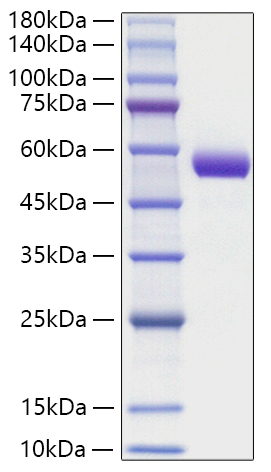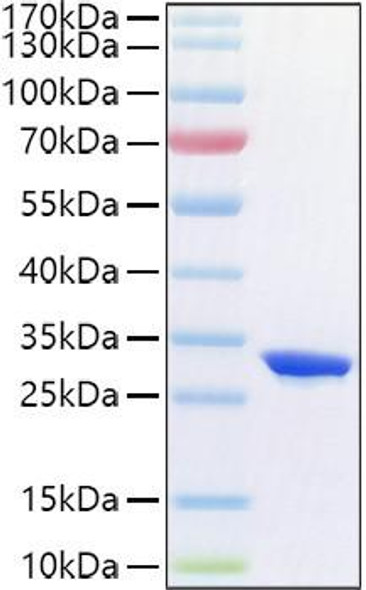Description
Recombinant Human Intrinsic factor/CBLIF Protein
The Recombinant Human Intrinsic factor/CBLIF Protein is a biologically active recombinant protein that plays a significant role in various cellular processes and signaling pathways in human biology. This protein is widely employed in immunological research, cell biology studies, protein-protein interaction analyses, and therapeutic development, providing researchers with a reliable tool for investigating Intrinsic factor/CBLIF function and its implications in health and disease.
This product (SKU: RPCB1831) is produced using HEK293 Cells and features a C-His tag for convenient detection and purification. The protein exhibits a calculated molecular weight of 44.25 kDa with an observed molecular weight of 45-60 kDa under denaturing conditions, achieving ≥ 95 % as determined by SDS-PAGE., ensuring exceptional quality and consistency for research applications.
Key Features
| High Purity by Affinity Chromatography | |
| Mammalian & Bacterial Expression Systems | |
| High lot-to-lot consistency via strict QC |
| Product Name: | Recombinant Human Intrinsic factor/CBLIF Protein |
| SKU: | RPCB1831 |
| Size: | 10 μg , 20 μg , 50 μg , 100 μg |
| Reactivity: | Human |
| Synonyms: | Cobalamin binding intrinsic factor, IF, GIF, INF, IFMH, TCN3, CBLIF |
| Tag: | C-His |
| Expression Host: | HEK293 Cells |
| Calculated MW: | 44.25 kDa |
| Observed MW: | 45-60 kDa |
| Gene ID: | 2694 |
| Protein Description: | High quality, high purity and low endotoxin recombinant Recombinant Human Intrinsic factor/CBLIF Protein (RPCB1831), tested reactivity in HEK293 Cells and has been validated in SDS-PAGE.100% guaranteed. |
| Endotoxin: | < 0.01 EU/μg of the protein by LAL method |
| Purity: | ≥ 95 % as determined by SDS-PAGE. |
| Formulation: | Lyophilized from a 0.22 μm filtered solution of PBS, pH 7.4. |
| Reconstitution: | Centrifuge the vial before opening. Reconstitute to a concentration of 0.1-0.5 mg/mL in sterile distilled water. Avoid vortex or vigorously pipetting the protein. For long term storage, it is recommended to add a carrier protein or stablizer (e.g. 0.1% BSA, 5% HSA, 10% FBS or 5% Trehalose), and aliquot the reconstituted protein solution to minimize free-thaw cycles. |
| Storage: | Store at -20℃.Store the lyophilized protein at -20℃ to -80 ℃ up to 1 year from the date of receipt. After reconstitution, the protein solution is stable at -20℃ for 3 months, at 2-8℃ for up to 1 week. |
Gastric intrinsic factor, also known as GIF, belongs to the of the cobalamin transport protein family. It is a glycoprotein produced by the parietal cells of the stomach. Gastric intrinsic factor plays a key role in the absorption of vitamin B12 on in the small intestine. Vitamin B12 bounds to haptocorrin after entry into the stomach. The resulting complex enters the duodenum, where pancreatic enzymes digest haptocorrin. In the less acidic environment of the small intestine, B12 can then bind to gastric intrinsic factor. This new complex travels to the ileum, where special epithelial cells endocytose them. Inside the cell, B12 dissociates once again and binds to another protein, transcobalamin II. The new complex can exit the epithelial cells to enter the liver.







